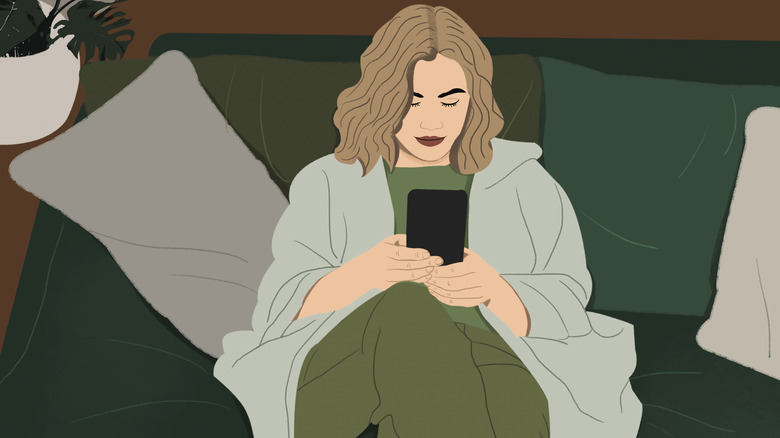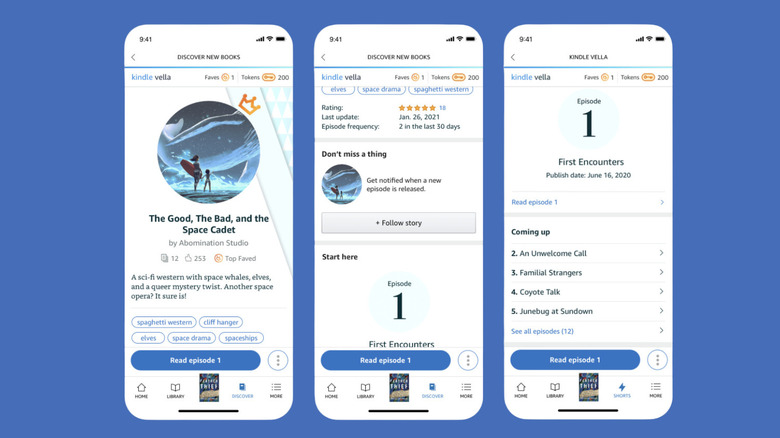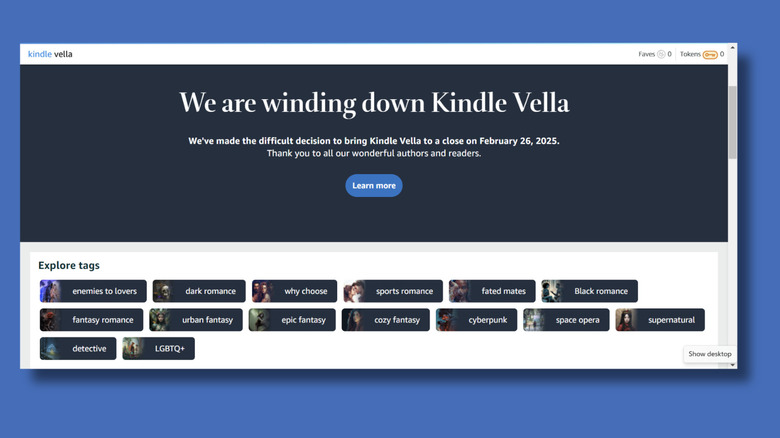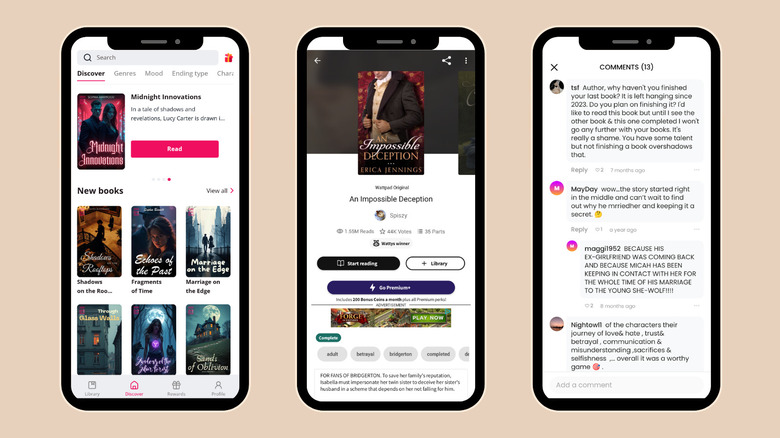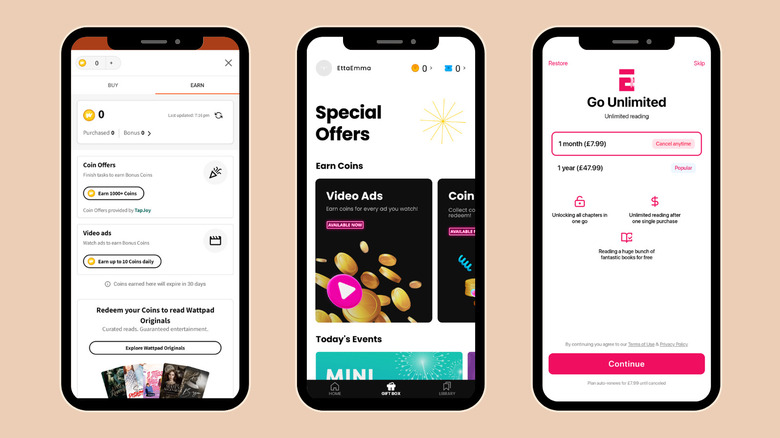Why Is Amazon Getting Rid Of Kindle Vella & Are There Alternatives To The Platform?
We may receive a commission on purchases made from links.
Kindle Vella, Amazon's serialized storytelling app, will be closing at the end of February 2025. The shutdown was announced last October, and from December 2024, there have been no new stories. Now, after 26 February 2025, you won't have access to Vella at all. If you are a Vella user hanging on until the bitter end, you need to immediately unlock any story episodes that you want to read. Once you've unlocked them, episodes will still be accessible on your Android or Google Kindle app, so you'll be able to read them at your leisure. If you still have Kindle Vella tokens left over after it closes, Amazon will offer you the opportunity to exchange them for an Amazon gift card, which will be credited to your Amazon balance.
It's the demise of yet another Kindle scheme. Vella has gone the way of other scrapped initiatives like Kindle Scout (a way for aspiring authors to have their books published by a Kindle imprint) and Kindle Worlds (where Amazon published rights-holder-approved fan fiction).
What was Kindle Vella?
Kindle Vella was launched in 2021 as a platform for readers to enjoy stories in bite-sized episodes. It was designed for mobile and online consumption, offering a way for authors and readers to connect through episodic storytelling. It was not the first – nor by any means the only – serialized web fiction platform. In many countries, including Japan and China, it's a well-established fiction format.
It's basically a way of bringing the serialization of stories into the smartphone era. This model has been in place for a long time. Arthur Conan Doyle's Sherlock Holmes stories first appeared monthly in The Strand magazine. Almost all Charles Dickens' books were first published this way, with serialized chapters appearing weekly or monthly in long-forgotten periodicals like Bentley's Miscellany and Master Humphrey's Clock.
At the time of its release, many authors were optimistic about the benefits that Amazon could bring to the serialized fiction app space. However, things haven't worked out as they –- and, presumably, Amazon –- had hoped. What went wrong?
Why is Amazon shutting down the service?
According to Amazon's official statement, "Kindle Vella hasn't caught on as we'd hoped." It's likely that Vella's readership was not enough to sustain the service, though Amazon has not released any official stats on its readership numbers. However, anecdotal evidence on author forums suggested that the readership was smaller than on other platforms like Wattpad and Radish. The low numbers on such a famous platform as Amazon can be attributed to several factors, including a lack of marketing. Authors complained that Amazon did not promote Vella much nor allow them to advertise their Vella books themselves the same way as they could for non-serialized e-books.
There were also limitations with the application itself. Kindle Vella – despite having 'Kindle' in its name – was not accessible through Kindles or other e-readers. This was considered a poor strategy as this was one way they could have outperformed their competitors. Readership volume was also hampered by the fact that Vella was only ever available in the USA and was never rolled out internationally. This left readers in other countries like Canada, Australia, and the UK unable to access serialized stories published on the app.
One contributor on the author forum Literature and Latte described Kindle Vella as a "Great idea, terrible implementation." Amazon had the opportunity to do some things better than other platforms, like advertising, e-reader compatibility, and incorporating it into other Kindle services like Kindle Unlimited but chose not to. As author Christie Stratos wrote on her blog, "(Amazon's) platform is so powerful, they could have leveraged it in really incredible, worthwhile ways."
What are the alternatives?
There are an impressively large number of serialized fiction platforms available. They're mostly available as Android or iOS apps, while a few also enable readers to access stories directly on their website. Some also include comics and audiobooks. Most have specialized areas of interest. Even the ones that aim to cover all categories of fiction end up specializing in particular areas. Royal Road, for example, while accepting all fiction genres for publication, mostly features science fiction and fantasy. Romance-themed reading apps like Radish, Epic Books, Dreame, and My Passion account for the lion's share of genre-specific reading apps.
As you would expect, the quality of the stories on these apps is extremely variable. However, even the paid-for models allow you to read the first few chapters of any book for free, so you can quickly work out whether or not a story is worth reading and abandon any that seem poorly written, full of grammatical errors, AI-generated, or simply not your cup of tea. Mind you, if you are a super-keen on one very niche fiction genre, you might be happy to overlook a few deficiencies of style in order to get your fix of werewolf prom queen isekai reverse harem romances.
When reading, you can leave comments throughout the story and read other people's comments. This and the occasional addition of authors' notes at the end of a chapter make the reading experience quite interactive. You feel like you are part of a reading community.
How much do serialized stories cost to read?
Some apps, including Royal Road, Inkitt, and Readict, are entirely free to use. Others require you to purchase coins to unlock new chapters and a few offer monthly or annual subscriptions.
Wattpad offers a selection of free stories, but you can opt for higher-quality Wattpad Originals if you are prepared to pay. A representative Wattpad original book provides four chapters for free and then you need coins. The cost of coins varies enormously depending on how many you buy. The smallest bundle is nine coins for $0.99, and the largest is 230 coins for $7.99. In our test, it cost five coins ($0.15 to $0.55) to read the next chapter or 124 coins ($3.72 – $13.64) to access the whole book. Alternatively, you can earn coins through tasks like watching video ads or completing surveys.
With Radish, you can begin reading stories for free, and further episodes will unlock after a certain amount of time. You can't read a book for free this way, though, as the most recent episodes require coins. The minimum purchase is six coins for $0.99, but you save money if you purchase larger quantities. The authors set the prices on their books, but three coins per chapter seemed to be a standard amount, equivalent to roughly fifty cents. There's a daily draw where you can win coins, and you can earn more by completing ad-based tasks. Other platforms like Webnovel, Epic Books, and GoodNovel have similar pricing strategies.
Methodology
To compile this article, I tested various reading apps, including Wattpad, Royal Road, Radish, Epic Books, Webnovel, Inkitt, GoodNovel, Dreame, My Passion, and Readict. These were tested on an Android phone and, where possible, on a laptop. Storytelling apps were considered from the point of view of readers rather than writers, so I didn't look at factors like pay rates for authors.
Information about Kindle Vella was obtained from Amazon sources, trusted websites, and author blogs and forums. Much of the behind-the-scenes workings of Kindle Vella, such as readership numbers and how author payments are calculated, has not been made publicly available by Amazon. This means that to find out this sort of information, I needed to rely on various authors' first-hand experience.
All prices were correct at the time of writing, but these can change at any time. We haven't tried to rank these apps or give specific recommendations, as readers' preferences will vary. However, for what it's worth, Wattpad was the only platform where I got so hooked on a story that I had to go back and finish it afterward.
